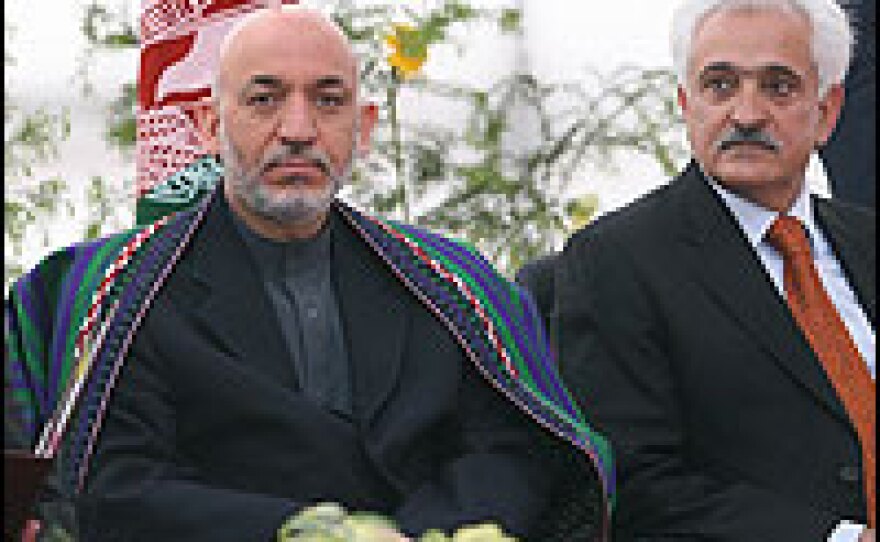
Afghanistan's fledgling democracy is strained these days. President Hamid Karzai is struggling to hang on to power amid a growing Taliban insurgency and power grab by former warlords who are trying to have a bigger say in policy decisions.
But after months of caving in to their demands, Karzai drew the line this week. And he did so for a man who he seems to have little in common with: his Westernized, left-leaning foreign minister, Rangeen Dadfar Spanta.
At a news conference in his Kabul palace this week, Karzai declared war in an uncharacteristic rant. But this war isn't against the Taliban. It's against the Afghan parliament, which is demanding that Karzai sack Spanta.
Karzai said that the demand is illegal, that Afghanistan's Supreme Court backs him up, and that he will stand by the foreign minister.
It's a confrontation that some Afghan political analysts believe could make or break Karzai. On the surface, it's a test of Afghanistan's new democracy, determining whether the president or parliament is in charge.
Afghan and Western analysts say the fight could be Karzai's last stand against the former warlords, who dragged Afghanistan through a quarter-century of war. These former mujahedeen are growing stronger amid the spreading insecurity in Afghanistan. They dominate the parliament, and they are threatening to shut it down if the foreign minister stays.
Spanta says he warned the president about the trouble he would cause when Karzai asked him to be foreign minister two years ago.
"I told him it was dangerous to work with me because of my leftist political past and my strong positions today," Spanta says, speaking in German. "Because as they say in German, I call things as I see them. [Karzai] said, 'No, I want you to do this anyway.'"
Spanta sees himself as the modern Afghan. He is as comfortable speaking German as he is his native Dari. He's an intellectual, who prefers Western suits over traditional tunics and baggy pants. He's a staunch supporter of women's rights. He embraces secularism and shuns tribal affiliations.
This modern, enlightened face of a post-Sept. 11 Afghanistan is what Karzai wants the world to see. But Spanta's persona and politics do not play so well with the power brokers in Afghanistan, especially after Spanta began to push for a public airing of war crimes that killed and maimed millions of Afghans.
"Many lawmakers felt targeted. They were scared that I, with the help of foreigners, was going to take them to court like Saddam Hussein," Spanta says. "That was never my intention. I want national reconciliation."
The former mujahedeen thought otherwise. They passed an amnesty bill that left Spanta's efforts dead in the water. Then, they went after Spanta himself.
The hunt began in earnest this spring, when Iran deported tens of thousands of Afghan refugees. The refugees were left stranded at the Afghan border without food and water.
Lawmakers summoned Spanta and the Afghan minister of refugees. They voted to fire the minister of refugees. A vote to fire Spanta failed, but his opponents rallied and ordered another vote.
This time, it passed. Qarimatullah, a lawmaker in the Kunduz province, voted to fire Spanta.
"The foreign minister's job is to look out for Afghans who live abroad. He did not do that. He didn't even know how many Afghans were in Iranian prisons," Qarimatullah says. "Nor did he know about an international agreement allowing the deportation. All of this led us to impeach him."
Qarimatullah says Spanta's holding of a dual Afghan-German citizenship is another reason he should no longer serve. But a foreign ministry spokesman says that Spanta has given up his German citizenship.
Meanwhile, Spanta's supporters say that the foreign minister made too many enemies because he refused to appoint relatives of powerbrokers to diplomatic posts.
One supporter, Kabul lawmaker Mir Ahmed Joyenda, says that Spanta did everything he could to help the refugees. He summoned the Iranian ambassador, sent letters to Tehran and to the U.N. refugee officials in Geneva, and complained to his Iranian counterpart, Joyenda says.
"What else he can do? Because when you have a valid passport with a visa — when the police of Iran tear it — what you can do?" Joyenda says. "Do you have rocket? Do you have B-52? You can attack Iran? No. Just you can protest. This much he can do."
Spanta says he has twice offered his resignation to Karzai in order to make the turmoil go away, saying that he prefers being a college professor anyway. But Karzai has refused Spanta's resignations.
Joyenda says that's a good thing. He believes that if Spanta leaves, it will spur Karzai's opponents into tearing up the rest of his government.
Copyright 2022 NPR. To see more, visit https://www.npr.org. 9(MDAzMjM2NDYzMDEyMzc1Njk5NjAxNzY3OQ001))







